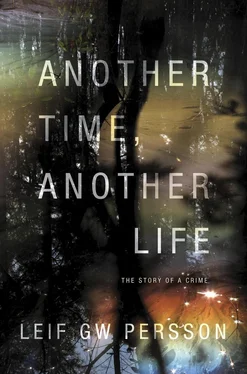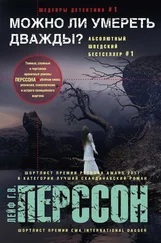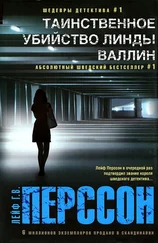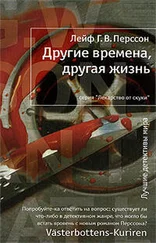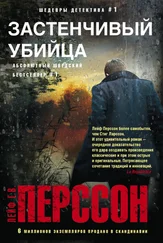“You mentioned that you thought Eriksson had started drinking a lot recently,” said Holt. “Have you thought any more about that, Mrs. Westergren?”
It was an impression she had, that was all. One time a month ago she thought she smelled alcohol when he greeted her on the stairway. Another time a week or so later she saw him get out of a taxi and thought he’d walked a little strangely when he disappeared into the entryway. She was already outside so they hadn’t even said hello to one another. It had made her think because these were new observations that didn’t jibe with her previous image of her reserved, well-ordered, and clearly sober neighbor.
An elderly couple also lived on the same floor. Despite repeated attempts by younger colleagues from the uniformed police, they could not be reached. But by talking with their neighbors Holt and Jarnebring found out that they lived in Spain during the winter and left Sweden as early as the beginning of October.
“Not so hard to find out,” Jarnebring muttered.
“We did it,” said Holt happily. “Didn’t take us more than half an hour.”
The third and final neighbor took longer than that, despite the fact that their younger colleagues had already talked with him on the morning after the murder. Back then they had received the brief reply that he had neither seen nor heard anything because he hadn’t been home during the evening in question, and if there wasn’t anything else then he preferred to be left in peace. And he would have been if it hadn’t been for the meticulous Gunsan, who found his name in an investigation file that the Stockholm police had set up before the expected disturbances in connection with the celebration of the anniversary of the death of Charles XII.
The neighbor was born in 1920, retired major with the infantry. As a twenty-year-old he had served with the Swedish volunteer corps in the Finnish Winter War, and he had never made any secret of the fact that his political sympathies were quite far to the right. “Obviously not a Nazi but nationalistic like every true Swede,” as he himself put it at an interview in connection with his application for a position with the Ministry of Defense staff in Stockholm in the mid-1960s. He had of course not gotten this job, and in response he had requested, and immediately been granted, discharge from the military.
For the last twenty years he had been a retiree, and he had apparently used his free time to give expression to his “nationalist sympathies” by promoting various societies and organizations. Finances had never been a problem for him both because he had wealthy parents and because as a youth he had inherited a large sum of money from an unmarried aunt. As with every real officer and gentleman “the pay was for keeping a horse.” He was a rumor-shrouded, decorated hero from the Winter War and the main character in many stories of a highly doubtful nature that were still part of the standard fare in officers’ messes around the country.
On Thursday the thirtieth of November he had taken part in the laying of a wreath at the statue of Charles XII, and a number of photos that police detectives had taken supported this. As soon as the celebration itself was over, the responsible police commander ordered him and his sympathizers — “under protest” — to be packed into a couple of rented busses, whereupon they were driven to the subway station at Östermalmstorg at a fairly safe distance from the counterdemonstrators in Stockholm City. From there he had walked straight home to Rådmansgatan and had arrived there at a quarter to eight in the evening, according to the detective who had followed him just to be on the safe side, and whom the irreproachable Gunsan naturally had sniffed out, despite the fact that he had not intended to say anything himself. Whatever. The major had been at home and not out as he had said, and because of that there were very pressing reasons for further questioning.
At first everything went beyond expectations. He was at home and opened the door and let them in when they rang. How often does that happen? thought Jarnebring. A short, austere, and very fit man who looked considerably younger than his almost seventy years. Who nodded brusquely at them as he looked at his watch.
“Go ahead and ask. I don’t have all day,” said the major.
But then things came to a dead halt. He had neither seen nor heard anything, and he firmly rejected all insinuations that he had previously given misleading statements.
“I came home about eight o’clock, as I told the young constable, so I don’t understand what you’re after, Inspector,” the major said, training his eyes on Jarnebring.
Hadn’t he heard that something was happening in the building? Had he, for example, not perceived that the police were conducting a rather extensive and far from silent crime scene investigation right outside his own front door? Had he not heard his doorbell ringing on at least two occasions during the evening? Had he not even peeked out into the stairwell through the peephole in his door?
Answer: no. For one thing his hearing was a little bad, like so many others who had fired thousands of shots without ear protection during a long professional career. For another thing he had been watching TV and as usual he’d had the sound at a rather high volume.
“I was looking at the news to see how much of our royal capital the police had let the hooligans tear down this time,” said the major.
Then he had gone to bed and fallen asleep immediately as was his habit. He did not know Eriksson. He had only spoken with the fellow on one occasion, and after that conversation he had no reason to do so again. His neighbor had seemed generally unreliable and ingratiating, and his sudden demise left him cold. His own experiences were different.
“Which experiences?” Holt asked.
The major had seen better men than Eriksson cut down, and he himself had been wounded in the battle of Salla when he was only twenty years old, and had fought side by side with his Finnish brethren against the Russian Bolsheviks.
“No big deal in itself,” said the major modestly. “I was on my feet within a week, which wasn’t true of most anyone. It’s a strange experience getting shot,” said the major, and for some reason it was Jarnebring he looked at as he said that.
“I can believe it,” said Jarnebring.
“The bullet entered my left side,” said the major. “The outside of the rib. But it bled copiously, and blood stands out against the snow, especially when it’s your own.”
Jarnebring did not say anything, but for reasons that he did not at first understand he suddenly spotted the old-fashioned black telephone with a round dial that was on the major’s desk.
“It took a while before my comrades could carry me out of there,” said the major. “I don’t think I’ve ever felt so alone.... and after what happened I became a different person. Neither better nor worse, but different.”
“I understand what you mean,” said Jarnebring.
“Yes, I suspected as much,” said the major. “People like me usually see these things.”
Given this and other experiences of a similar nature the major was not one to spend time agonizing over someone like Eriksson, who had obviously socialized in the wrong circles and had met his death in an unfortunate way that was causing trouble for those around him. But what else would you expect from someone like him?
“What do you mean by that?” It was Holt who asked the question.
“A run-of-the-mill disguised proletarian trying to play the gentleman,” said the major. “He didn’t fool me.”
How did he know that? Was he familiar with Eriksson’s background? Holt again.
“You can sense that sort of thing. The fellow was a wretch,” the major snorted.
Читать дальше
